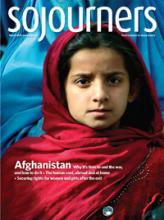When the Vietnam-era draft ended, I thought it would have little effect on the anti-war movement. I was wrong. In short order, meetings and rallies shrank from mass gatherings to small groups of the faithful. Why? Because the segment of the population that was paying the true cost of the war became much smaller. The sacrifice necessary to continue fighting was no longer spread out over a large segment of society; now only a small number of families would experience the anxiety of sending their children to war.
Today, too few know the cost of war. The financial costs are being put on a credit card for our children and the human cost is relegated to a small portion of society. If the draft existed today, the country would be too busy protesting our continued engagement in Iraq and Afghanistan to pass on false rumors of "death panels" in health-care legislation. The possibility of endless war through permanent bases in Afghanistan has met with little public outcry. If every mother of military-age children knew that her child could be drafted, I wonder if the country would be so quiet.
What weighs on my mind is the growing cost of war and that so few are actually seeing the bill, both human and financial. In the two wars, there have been nearly 6,000 U.S. deaths and 40,000 wounded. Tens of thousands of others suffer from post-traumatic stress and other psychological disorders, and a growing number of veterans are committing suicide. Hundreds of thousands of Iraqis and Afghans have died, which is hardly ever a focus of American consciousness.
Read the Full Article
